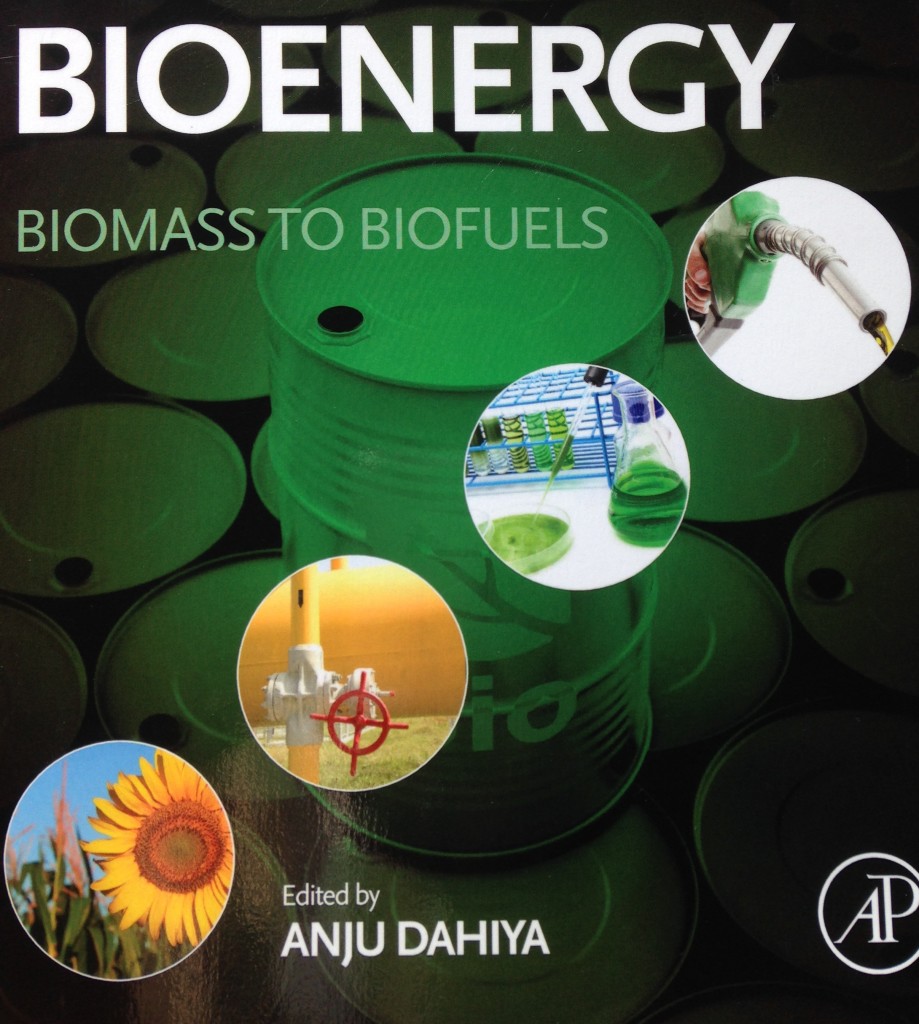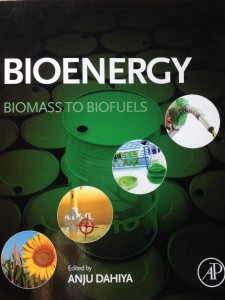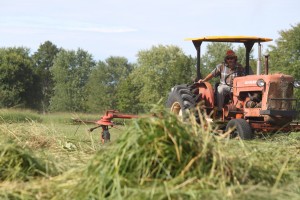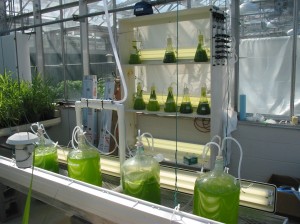Bioenergy: Biomass to Biofuels; is an innovative new textbook that provides insight into the potential and current advances and benefits of biofuel. Contributions include an extensive list of well-respected university extension programs, such as The University of Vermont Research Extension, as well as numerous national organizations including the US Department of Energy’s National Renewable Energy Laboratories. The text is edited by Anju Dahiya, cofounder of General Systems Research, LLC and lead biofuels instructor at the University of Vermont’s Rubenstein School of Environment and Natural Resources, both of which stand as leaders in cutting-edge topics such as microbial fuels and biogas. The chapters of the book are divided into solid, liquid and gaseous biofuels, and further explore cost-effective production as well as discussions covering economics, environment and policy.
Organized into seven accessible sections, Bioenergy: Biomass to Biofuels begins with an in-depth overview of the transformation of biomass into biofuels. Once the basics are covered, readers move on to the technical applications of solid feedstocks, such as wood and grass, and their transformation into biofuels. The following section discusses biomass to liquid biofuels—text focuses on oilseeds, cellulose ethanol, and algae as feedstocks. Anaerobic digestion is explored in a section outlining gaseous fuels and bioelectricity and focuses primarily on livestock manure feedstocks. Throughout the chapters, the tradeoffs and benefits of these different feedstocks are outlined through deeper analysis.
Multiple chapters focus in detail on conversion pathways for cost effective biofuel production. The myriad of topics include basic biodiesel production efficiency, converting petroleum-based infrastructure into biorefineries, reducing enzyme cost through varying combinations, and sustainable aviation biofuels. The text concludes with a robust section that connects biofuels to a big picture perspective—economics, sustainability, environmental implications, and policy are examined closely in relation to renewable resources, future uncertainties, and entrepreneurship.
Bioenergy: Biomass to Biofuels is structured to meet the needs of professionals finding their way in the field, students in need of an introduction, and instructors establishing a course on biofuels. Case studies on provided topics are found at the end of every section and are based on documented implementation projects. Bioenergy: Biomass to Biofuels is available for purchase on the Elsevier publisher website. Editor Anju Dahiya, owner of General Systems Research in Burlington, Vermont and is a Vermont Bioenergy Initiative grant recipient to advance research and applications of converting algae into biofuel.
Vermont is an indisputable leader in sustainable job growth and renewable energy, punching well above its weight in the fight against global climate change. It is because of opportunities like the upcoming summit, Creating Prosperity & Opportunity Confronting Climate Change, that local business, government, non-profit, and higher education leaders will come together to focus on advancement of sustainable job growth in fields that have a positive impact on the environment and local economy. Organizations including the Vermont Energy Investment Corporation, Renewable Energy Vermont, Green Mountain Power, University of Vermont, Energy Action Network, several government agencies, and multiple renewable energy businesses will converge at Vermont Technical College on Wednesday, February 18th for Vermont’s climate change summit sponsored by the Vermont Council on Rural Development. The day will commence with a keynote address from Vermont Governor Peter Shumlin who will speak about “Vermont as Climate Economy Leader.” The recently reelected Governor’s inaugural address, focused heavily on energy and the environment and the summit provides an opportunity for Vermonters concerned with regional climate change to learn more about his upcoming plan of action.
A “Climate Science Fishbowl” will follow, focusing on the effects regional and global climate change will have on Vermont’s future. Moderated by Mark Johnson, host of WDEV’s The Mark Johnson Show, the panel will feature Jon Erickson of Rubenstein School, UVM, Alan Betts of Atmospheric Research, and Gillian Galford of VT Climate Assessment, UVM. Two sets of breakout sessions round out the rest of the day; the first focusing on “climate economic policy” followed by “ideas for action” in the afternoon. Those interested in bioenergy might elect to attend breakout sessions such as “Advancing Community-Based Climate Action” moderated by Johanna Miller of VECAN and the VT Natural Resources Council or “Developing Ubiquitous Distributed Energy” moderated by Chuck Ross, Secretary of VT Agency of Agriculture, Food & Markets. Additionally, “Spurring Research and Development for New Technologies in Vermont” moderated by Ted Brady, USDA Rural Development seems to complement the Vermont Bioenergy Initiative’s work building the new frontiers in bioenergy for the State of Vermont. To register and for a complete schedule visit: http://vtrural.org/programs/climate-economy/summit.
Beautiful fields of sunflowers growing in Newbury and Shaftsbury, Vermont will have an unusual future: the flowers’ seeds will be converted to biodiesel and livestock feed. The fuel will be used in Green Mountain Power’s fleet of vehicles and for building heating, saving Green Mountain Power customers money and reducing greenhouse gas emissions and other pollutants. The feed will be used on Vermont farms to supplement animal nutrition.
“Green Mountain Power is leading the way in many local energy initiatives,” said Green Mountain Power President and CEO Mary Powell. “Using Vermont sunflowers to power our vehicles and heat our buildings is a beautiful way to keep our energy local and clean.”
Twenty acres of sunflowers are growing at the State Line Farm Biofuels in Shaftsbury and another ten acres are growing at the Ekolott Farm in Newbury. When the oilseeds are harvested this fall, they will be dried and pressed, then the raw oil will be converted to biodiesel, or B100. The solid portion of the seed, the meal, is valuable as a livestock feed. Depending on the crops’ success, the cost of fuel to Green Mountain Power could be up to one dollar less than current B100 prices.
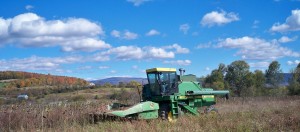
Sunflowers being harvested at State Line Biofuel Farm in Shaftsbury VT
“It is so great to be part of this innovative test with GMP,” said John Williamson of State Line Farm Biofuels. “Projects like this really help support farmers, plus it’s beautiful to see the fields of sunflowers and even more beautiful to realize it will provide a clean and local power source.”
This pilot is a partnership between Green Mountain Power, UVM Extension, and the Vermont Bioenergy Initiative. UVM Extension and the Vermont Bioenergy Initiative have worked together for several years to encourage the growth of oil seeds as an energy source and the addition of Green Mountain Power is hoped to accelerate this effort even further.
“As a result of the Vermont Bioenergy Initiative, several pioneering farmers in Vermont now have the necessary infrastructure to produce sustainable biodiesel,” notes Chris Callahan, UVM Extension Agricultural Engineer. “This is a unique model: local production for local use. The partnership with Green Mountain Power means more gallons will be made which means lower cost for everyone.”
“The goal is for local biodiesel production to both shave fuel costs for our customers while helping to develop new markets for locally produced liquid fuels,” said Powell. “We see this benefiting local farms and customers as we work together to provide more clean cost-effective and reliable power.”
###
About Green Mountain Power
Green Mountain Power (GMP) serves approximately 265,000 residential and business customers in Vermont and has a vision to be the best small company in America by empowering customers to save money and move to clean energy sources. GMP recognizes the role of electric utilities is changing and is focused on a new way of doing business to meet the needs of customers with integrated services, while continuing to generate clean, cost-effective and reliable power in Vermont. In 2014, Vote Solar named GMP a Solar Champion. More information at: www.greenmountainpower.com.
About the Vermont Bioenergy Initiative
A program of the Vermont Sustainable Jobs Fund, the Vermont Bioenergy Initiative connects diversified agriculture and local renewable energy production for on-farm and community use by supporting research, technical assistance, and infrastructure development in emerging areas of bioenergy including biodiesel production and distribution for heating and transportation, oil crops for on-farm biodiesel and feed, grass for heating, and algae production for biofuels and wastewater management. More information at: www.VermontBioenergy.com.
09 Apr 2014
Emerging Frontiers in Bioenergy
Green Energy Times is an independent media company that publishes and energy independent website and newspaper. The power used to design the print publication and operate the website is completely off-the-grid and solar powered. Green Energy Times publishes all ranges of renewable energy and climate action news and articles from across Vermont and the region.
The Vermont Bioenergy is pleased to be authoring a regular column entitled Emerging Frontiers in Bioenergy. We plan to share each upcoming article on the Field Notes part of this website, and to get you up-to-speed, we wanted to share the first three in the series:
Oilseeds, Grass & Algae Each Hold a Place in Vermont’s Renewable Energy Future
This article reviews how bioenergy refers to renewable energy fuels and feedstocks derived from forest and agricultural biomass, liquid biofuels, and biogas to be used for heat, electricity, or vehicle fuel.
Grass Energy: State of the Science
This article explores the potential for grasses grown on marginal lands in Vermont to meet a portion of the state’s heating demand and reduce the consumption of fossil fuels and the study being conducted to assess the opportunities.
From Ponds to Fuel Tanks: The Role of Algae in our Energy Future
In this article, algae production is discussed as an excellent source of oil for making biodiesel, which could displace substantial volumes of petro-diesel for heating and transportation.
Learn more about Green Energy Times at www.GreenEnergyTimes.net and the Vermont Bioenergy Initiative at www.VermontBioenergy.com.




